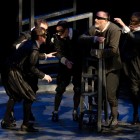Rigoletto 2023Diva Opera
Read more about the opera Rigoletto
Diva Opera were established in 1997 and have been touring widely - as far afield as Japan, and earlier this year they visited South Africa. This summer includes tours in England and France as well as a visit to Jersey. They are still under the direction of the founders, Anne Marabini Young and Bryan Evans.
On this visit to St Andrews there were two performances, Verdi's great tragedy Rigoletto and Donizetti's delightful comedy The Elixir of Love. These were the company's only Scottish appearances. The Verdi had an extremely simple but effective set, with money clearly being allocated to an excellent array of appropriate 16th century costumes.
Rigoletto is undoubtedly one of the greatest and most popular operatic tragedies ever written. If there was any doubt as to how it would come over with piano accompaniment and no chorus this was answered within minutes of the opening. Bryan Evans has been the company's Music Director since the beginning, and he is an excellent musician, with an idiomatic sense of Verdian style. To suggest that the orchestra was not missed would be silly, but these piano reductions can work amazingly well. He even provided an atmospheric thunderstorm in the final scene.
The chorus for this opera is male only, and with three comprimario voices - tenor (Borsa), baritone (Marullo) and bass (Ceprano) they were able to provide plenty of dramatic impact along with their excellent singing. The only female vocalist in the opening scene is Countess Ceprano, but the two excellent soloists required later for Giovanna and Maddalena were able to make up the numbers for dancing.
The soloists were largely singers with excellent technique and good acting ability. The Gilda, Gabriella Cassidy, has already sung the part with ENO but here showed herself completely at ease with the Italian text. Her phrasing in 'Caro nome' was lovely and elegant, and she contributed well to the various duets and ensembles, especially the stirring Act 2 Finale and the Act 3 quartet and trio. Ashley Catling worked with Scottish Opera and the Edinburgh Festival at the start of his career. He has since spent several seasons woth Diva Opera and also some time with Opera North. More recent Scottish appearances have been with English Touring Opera. His voice still has a delightful sweet tone and he made a youthfully attractive Duke, though it is probably quite a heavy part for him.
Philip Smith made an excellent impression in the title role, with plenty of subtle singing while pulling out all the stops when required. Timothy Dawkins revealed a smooth velvety bass as Sparafucile, while Stephanie Windsor-Lewis made an excellent impression as his sister in the final act. Louise Mott, not seen up here for some while, made Giovanna into rather more than the cipher that she can be too often. David Stephenson, who started his career at Haddo House many years ago, made a welcome return in Monterone's two short but vital scenes.
The layout in the hall was different from previous performances we have attended. The stage and piano were on the long east wall, just in front of the stage door. This created a thrust stage with the packed audience on three sides. The floor was adjusted to have several levels (all flat) with only three rows of seats. Sightlines were excellent and the singers were careful to ensure that the voices were projected in all directions. The supertitle screens were well placed for maximum visibility.
With very few exeptions this arrangement worked very well, and the crowded audience, around 150, was extremely enthusiastic.
Performance Cast
- Duke of Mantua
- Matteo Borsa a courtier
- Marullo a courtier
- Count Ceprano a courtier
- Countess Ceprano
- Rigoletto a jester
- Count Monterone
- Sparafucile a professional assassin
- Gilda Rigoletto's daughter
- Giovanna Gilda's duenna
- Page to the Duchess
- Maddalena sister of Sparafucile
